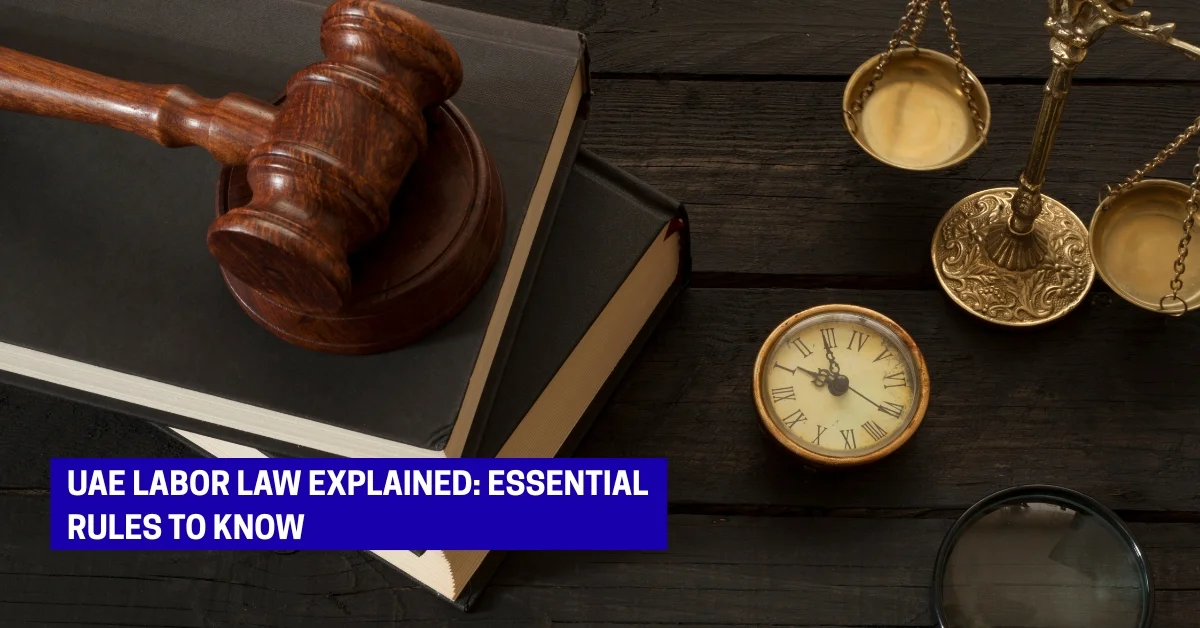The UAE Labor Law is one of the most important regulations for both employees and employers. It sets the foundation for how workplaces operate in the country, covering everything from contracts and wages to benefits and dispute resolution.
Recent updates to the law have introduced more flexible working models, equal pay policies, and clearer rules for termination and notice periods. These changes have modernized the workplace, making it fairer and more transparent.
Understanding the UAE Labor Law
The UAE Labor Law is designed to regulate the relationship between employers and employees. It ensures fair treatment, prevents exploitation, and provides clear rules that all businesses must follow.
It covers:
- Employment contracts
- Wage and salary payments
- Working hours and overtime
- Employee rights and benefits
- End-of-service gratuity
- Termination and dispute handling
The law mainly applies to the private sector. Government employees and workers in certain free zones may follow different rules.
1. Why the UAE Labor Law Matters
- Protects workers’ rights by ensuring fair contracts, salaries, and benefits.
- Helps employers by setting clear guidelines, avoiding disputes, and creating a transparent workplace environment.
Employment Contracts Under UAE Labor Law
Contracts are the foundation of any working relationship. The UAE Labor Law recognizes two types of contracts:
- Limited (fixed-term): valid for a set period (usually 2–3 years).
- Unlimited (open-ended): continues until either party ends it with proper notice.
1. Mandatory Contract Details
Every employment contract must include:
- Job title and description
- Salary and allowances
- Leave entitlements
- Working hours
- Notice period
- Contract duration (if limited)
2. Probation Period Rules
- Employers may place employees on probation for up to 6 months.
- During probation, either party may terminate the contract with proper notice.
Comparison of Limited vs. Unlimited Contracts
| Feature | Limited Contract | Ends when the contract expires |
| Duration | Fixed term (2–3 years) | No fixed duration |
| Renewal | Must be renewed upon expiry | Automatically continues |
| Termination | Ends when contract expires | Requires notice to terminate |
Working Hours and Overtime Rules
The UAE Labor Law sets clear guidelines on working hours:
- Standard working hours: 8 hours per day or 48 hours per week.
- During Ramadan, working hours are reduced by 2 hours per day.
- Overtime: Employees must be compensated at a higher rate if they work extra hours.
Exceptions: Some industries, such as healthcare, hospitality, and security, may have special arrangements due to operational needs.
Employee Rights and Benefits
Employees in the UAE are entitled to a range of benefits:
- Annual leave: At least 30 days of paid leave after one year of service.
- Public holidays: Paid leave on official holidays declared by the government.
- Sick leave: Up to 90 days per year (first 15 days full pay, next 30 days half pay, remaining unpaid).
- Maternity leave: 60 days (45 days full pay, 15 days half pay).
- Paternity leave: 5 days paid leave.
- Health insurance: Employers must provide medical coverage for employees.
Wages and End-of-Service Gratuity
The UAE uses the Wage Protection System (WPS) to make sure salaries are paid on time. Employers must transfer salaries electronically through this system.
1. Salary Payment Rules
- Salaries must be paid at least once a month.
- Employers cannot make unlawful deductions.
2. End-of-Service Gratuity
Employees who complete at least one year of service are entitled to gratuity.
- First 5 years: 21 days’ basic salary for each year of service.
- After 5 years: 30 days’ basic salary for each additional year.
3. Sample Gratuity Calculation
If an employee has a basic salary of AED 10,000 and has worked for 6 years:
- First 5 years: 21 × 5 = 105 days = AED 35,000
- Sixth year: 30 days = AED 10,000
- Total gratuity = AED 45,000
Termination and Resignation Rules
The UAE Labor Law sets strict rules to make sure both employees and employers handle the end of employment fairly. Whether it’s the employer ending the contract or the employee resigning, proper notice and legal procedures must be followed.
1. Notice Period
Under UAE labor law, both employers and employees are required to follow a notice period ranging from 30 to 90 days, as specified in the contract. During this period, the employee continues to receive their salary and benefits. If either side fails to respect the notice requirement, they may need to pay compensation equal to the employee’s basic salary for that duration.
2. Termination by Employer
Employers are allowed to terminate contracts, but only for legally valid reasons. These include poor performance, serious misconduct, redundancy, or business closure. To avoid disputes, employers must provide clear justification and supporting documents, such as warning letters or performance reviews, especially in cases of performance or behavior issues.
3. Resignation by Employee
Employees can resign from their job by giving written notice as required in their contract. They are expected to continue performing their duties during the notice period and return any company property before leaving. However, if the employer breaches the contract, such as not paying salaries for more than 60 days, employees may resign without serving notice.
4. Unlawful Dismissal
The UAE Labor Law protects employees from unfair or wrongful termination. An unlawful dismissal occurs if an employee is fired for reasons such as filing a complaint, facing discrimination, or being dismissed while on maternity or protected leave. In such cases, the employee has the right to file a complaint with MOHRE, and the employer may face fines or be ordered to compensate the worker.
Workplace Obligations for Employers
Employers have to comply with labor laws and protect workers.
Employer responsibilities include:
- Provide safe and healthy working conditions.
- Issue valid and legal contracts.
- Pay salaries on time through WPS.
- Grant annual, sick, and maternity leave.
- Respect notice periods during termination.
Dispute Resolution and Penalties
Disputes between employers and employees are handled by the Ministry of Human Resources and Emiratisation (MOHRE).
- Employees can file a complaint through MOHRE online or in person.
- MOHRE mediates to resolve the issue fairly.
- Employers who violate the law may face heavy fines, company bans, or legal action.
Recent Updates to UAE Labor Law
The UAE has modernized its labor law to align with international standards. Some key updates include:
- Flexible work models: Options for part-time, temporary, and remote work.
- Equal pay: Men and women must receive equal pay for the same job.
- Clearer probation rules: Employers must give proper notice during probation.
- New leave rules: Expanded maternity and paternity benefits.
These updates aim to attract global talent, promote fairness, and support a modern workforce.






